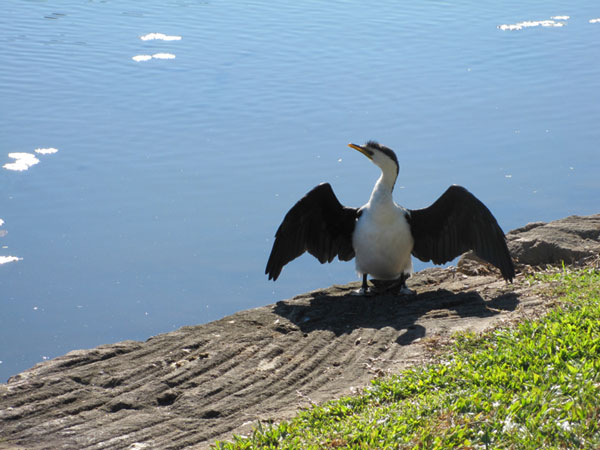At the Foot of Giants: Hugh Possingham
Add Summary

Blogger: Abigail Lynch, a doctoral candidate in the Department of Fisheries and Wildlife and a CSIS member, blogs from Down Under -- she's in Australia to build a framework for her dissertation research. She's interested in developing a decision-support tool to regulate harvest management strategies for lake whitefish in a changing climate.
At the Foot of Giants: Hugh Possingham
Friday, June 17, 2011
Hugh Possingham is a pretty big deal. He’s written over 220 papers and received over 5,500 citations. He’s also “the Don” of Marxan, a reserve design software which was initially used to design rezone the Great Barrier Reef Marine Park (where I hope to visit in a few weeks) and has since been used for conservation planning in over 100 countries. So, I’m not embarrassed to admit that I was a bit nervous for my first meeting with him today. But, I had no reason to be -- he invited me to take a stroll around the campus and we had a really easy conversation while we soaked up the Brisbane vitamin D.
Even from our casual conversation, it’s clear that Hugh has a lot of experience and, as a result, a very interesting perspective. He brought up a number of good points that I need to keep in mind as I start to design my project:
- Work at the scale of the management: while scientists always want a finer resolution, if a manager is working with a coarser unit, the application of the research can only be useful to that level.
- Ensure that the research question addressed is a valid management question: this is a concept that I familiar with, but always good to keep in mind!
- Look into the applicability of Info Gap Theory: Regan et al. (2005) was the first to use it in applied ecology, but it is still uncommon in the fisheries literature. Basically, it’s a good approach to use when there is great uncertainty surrounding the estimate of a parameter. I have to get a better grasp of the data available to me, but there’s potential to be large uncertainty, particularly around the impacts of climate projections on the fish.
 I was also lucky enough to sit in on a presentation by Chris Brown this afternoon entitled: A Global Imprint of Climate Change on Marine Biological Systems. Basically, Chris did a meta-analysis using 265 studies (most of which were in the northern hemisphere, predominately NE Atlantic; there was a noticeable gap in the tropics as well). He examined demography, community structure, abundance, phenology, and distribution for a range of taxa. For all of the taxa (except sharks and rays), the change with climate was greater than expected from chance, indicating that climate change is already influencing marine ecosystems. I think you have to take meta-analyses with a grain of salt if you are unclear on all of the underlying assumptions, but Chris has some interesting findings and his results could certainly fuel some future studies!
I was also lucky enough to sit in on a presentation by Chris Brown this afternoon entitled: A Global Imprint of Climate Change on Marine Biological Systems. Basically, Chris did a meta-analysis using 265 studies (most of which were in the northern hemisphere, predominately NE Atlantic; there was a noticeable gap in the tropics as well). He examined demography, community structure, abundance, phenology, and distribution for a range of taxa. For all of the taxa (except sharks and rays), the change with climate was greater than expected from chance, indicating that climate change is already influencing marine ecosystems. I think you have to take meta-analyses with a grain of salt if you are unclear on all of the underlying assumptions, but Chris has some interesting findings and his results could certainly fuel some future studies!
Lynch's studies are supported by a William W. and Evelyn M. Taylor Endowed Fellowship for International Engagement in Coupled Human and Natural Systems, an International Studies and Programs Predissertation Award, an Ecology, Evolutionary Biology, and Behavior Summer Fellowship, a Graduate School Research Enhancement Award, and a travel award from the College of Agriculture a



 Print
Print Email
Email




